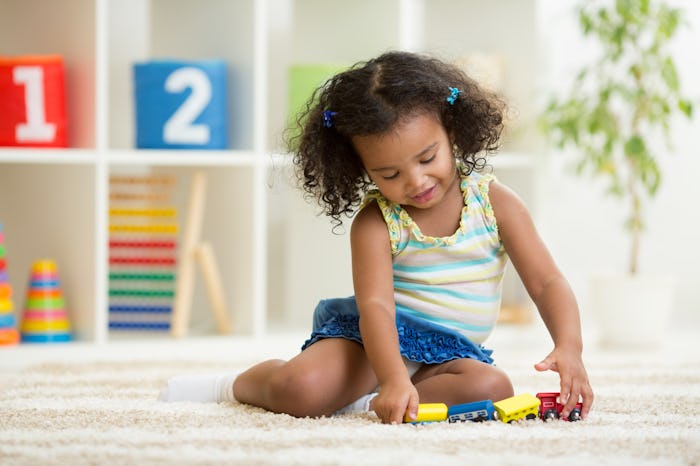Life

Turns Out, Independent Play *Seriously* Changes Your Baby's Brain
Everything your sweet baby does is precious and, quite frankly, brilliant. You hang onto every word of their elaborate, made-up stories, recited in their angelic little voices. You live for those moments when you're sprawled out on the carpet with them, surrounded by toys and going the extra mile to elicit one of their darling giggles. That is... until you have a full to-do list and a boatload of work to catch up on. Lucky for you, letting your child play alone is not only acceptable, but incredibly beneficial. Independent play can change your baby's brain for the better, so don't feel guilty next time you tap out of playtime.
As a parent, there is nothing more beautiful and thrilling than teaching your child something new. You might as well be their on-call hype man, showering them with cheers and compliments for each and every new development. But don't underestimate the importance of your child learning to do things on their own. Julia Forgie, developmental psychologist and professor in the School of Early Childhood Studies at Ryerson University, urges parents to take a step back. "What is so important and valuable about independent play is that it is free, not regulated by an adult or teacher," Forgie says in an interview with Romper.
When you play with your child, they're likely to mirror the things they see you do, and the way you use certain objects. Remove yourself from the equation, and your child is left to their own devices. As they tinker with toys and discover new surprises, they're taking mental strides as well. "Some skills and abilities that develop through solitary play include creativity, imagination, attention regulation and focus, perseverance, problem solving and trial and error, as well as gross and fine motor skills. But probably, most importantly, it builds confidence and independence," Forgie says.
So, what exactly is happening within the brain as your child engages in solitary play? Sergio Pellis, a neuroscientist at the University of Lethbridge, believes his experience researching the effect of playing on the brains of rats may provide insight to this question. "The experience of play changes the connections of the neurons at the front end of your brain, and without play experience, those neurons aren't changed," said Pellis in an interview with NPR.
The "front end of your brain" that Pellis mentioned? Well, it's pretty dang important. This area, officially known as the prefrontal cortex, has been associated with problem solving, decision making, and emotion regulation, according to Nature.com. In her TIME article "The Secret Power of Play," writer Siobhan O'Connor elaborated on how childhood playtime can benefit people as adults.
"The apparent randomness of play may be its secret genius. Part of what sets humans apart from other animals is the range of creativity, flexibility and adaptation. That’s precisely what free play — play without the encircling structure of adults — helps promote. Children who can entertain themselves, or play with one another, are unconsciously learning how to adapt themselves to challenges they’ll face further down the road," wrote O'Connor.
If you're thinking to yourself, "OK, this all makes sense, but it's easier said than done," you're not alone. Convincing your child to play independently isn't always the easiest endeavor, but it's a worthwhile one. According to Ashley Phillips for Parents, the key is helping your child slowly ease into independent play. Sit beside your child without joining in their play, and then eventually move to another area of the room. Make sure they are safe and comfortable, and avoid giving them instructions or commands for how they choose to play.
Forgie tells Romper, "Children and babies learn so much through freely exploring the world: wondering, asking questions, problem solving, and taking risks." In other words, sit back, relax, and watch your baby flourish. Their brain will change, but only for the better.